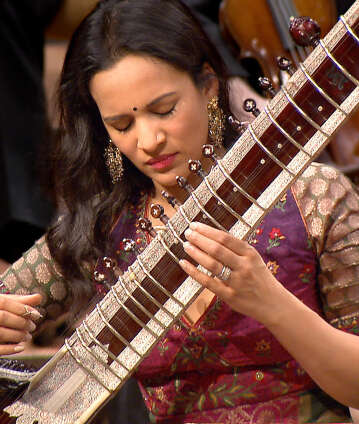Zubin Mehta and Anoushka Shankar

The Indian sitar player Ravi Shankar was one of the great musical intermediaries between East and West. His work Raga-Mālā links the art of sitar improvisation with the performed playing of a classical concert: an exciting journey into a faraway world. The soloist in this performance from 2017 is the composer’s daughter Anoushka Shankar; the conductor is Zubin Mehta, who was his friend for many years. Bartók’s Concerto for Orchestra concludes the evening.
“Everybody knew India through Ravi.” These words, with which Zubin Mehta paid homage to the sitar player Ravi Shankar when he died in 2012, hint at the artist’s significance: no other Indian instrumentalist and composer made the music and musicianship of his home country as internationally known as he did. Throughout his life Shankar considered himself an intermediary between East and West. When he was young he travelled as a member of his brother’s dance group to Europe, where he got to know classical music. Later, he trained with the famous Indian pedagogue Allauddin Khan in traditional sitar playing and achieved such a level of mastery that he became a soloist who gave concerts internationally. He collaborated with very diverse Western artists, with Yehudi Menuhin, with the guitarist of the Beatles, George Harrison, with André Previn, Philip Glass – and his compatriot Zubin Mehta, with whom he was friends for many years.
Mehta was also the person who accompanied the process of creation of Raga-Mālā, Shankar’s Second Concerto for sitar and orchestra, a work commissioned by the New York Philharmonic Orchestra, and who premiered the work in 1981 with Shankar as the soloist. This piece is based on approximately 30 ragas, traditional Indian melodic patterns, and links the oriental art of improvisation with the performed playing of a classical concert. Zubin Mehta brings the work to Berlin for his concerts with the Philharmonic. The soloist is Ravi Shankar’s daughter Anoushka, who learned to play the sitar from her father, and who was born in the year Raga-Mālā was composed.
Just as for Ravi Shankar, for the Hungarian Béla Bartók too the traditional music of his homeland formed the basis of his music. For years, the composer was on the road, listening to the folk’s songs and to their way of making music. The special rhythms and melodic articulation of folk music were an important source of inspiration for Bartók and decisively influenced his musical language, including the language that he used in the Concerto for Orchestra. “The title of this symphonic orchestral work finds its explanation in the soloistic treatment of individual instruments or sections of instruments,” Bartók wrote on the programme for the premiere. He composed the work in 1943, a commission from the Koussevitzky Foundation. At that time Bartók, who in 1940 had left his home country, threatened as it was by war and fascism, was living in American exile, terminally ill and in difficult material circumstances. The Boston premiere of the concerto delivered the disheartened composer one last major success.
© 2017 Berlin Phil Media GmbH
Related interview